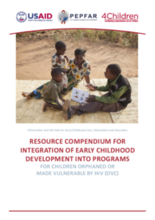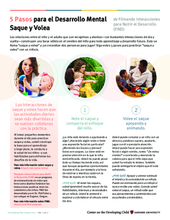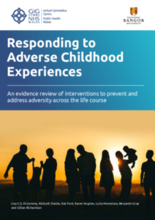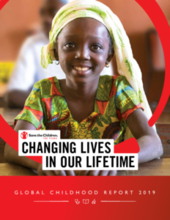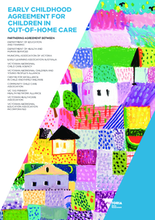Displaying 151 - 160 of 496
Written for USAID and PEPFAR implementing partners, with a focus on OVC practitioners, this is a user-friendly compendium of current resources, information and job aids for early childhood care, stimulation and education.
In this paper, the authors advance a framework for examining the nature and consequences of neglect, which they posit can be represented as variations along a continuum from severe psychosocial neglect to environmental enrichment.
Para ayudarle a los sistemas de primera infancia en los E.E.U.U. a aprender a trabajar con padres de maneras que promuevan resultados equitativos y maximicen las oportunidades para todos los niños 40 padres líderes y personal de agencias de nueve comunidades de Early Childhood Learning and Innovation Network for Communities (EC-LINC) se reunieron en enero de 2018 para crear un manifiesto para el cambio.
This brief guide from the Harvard Center on the Developing Child outlines 5 steps for primary caregivers to practice serve and return with their child.
Esta guía breve del Harvard Center on the Developing Child presenta 5 pasos para cuidadores practicar “saque y volea” con su niño/a.
To support innovation in addressing adverse childhood experiences (ACEs), the authors have undertaken a review of evidence on common approaches to prevent ACEs and/or mitigate their negative impacts in Wales.
This research poster presents an overview of a study conducted in Northern Italy. The study's aims were to: (1) investgate the associatons among atachment paterns, Emotonal Regulaton (ER) strategies and internalizing or externalizing symptoms showed by adolescents in residental-care and (2) examine the predictve role of atachment and ER strategies for the rates of internalizing/externalizing symptoms.
In commemoration of its founding 100 years ago, Save the Children is releasing its third annual Global Childhood Report to celebrate progress for children.
The Early Childhood Agreement for Children in Out-of-Home Care (OOHC) was first developed in 2014 as a shared commitment by the Victorian Department of Education and Training (DET), the Department of Health and Human Services (DHHS), the Municipal Association of Victoria (MAV) and Early Learning Association Australia (ELAA) to support young children in OOHC in Victoria, Australia to access key early childhood services.
This research debrief includes the qualitative and quantitative findings from a study of parenting attitudes and practices in coastal Kenya that set out to cast new light on the First 1,000 Days, understanding this life-stage from the vantage point of families and communities. This study has been carried out with the sole purpose of bringing new insights on early childhood and childcare to the EC community, to help improve support for and services to 0–3 year olds.

